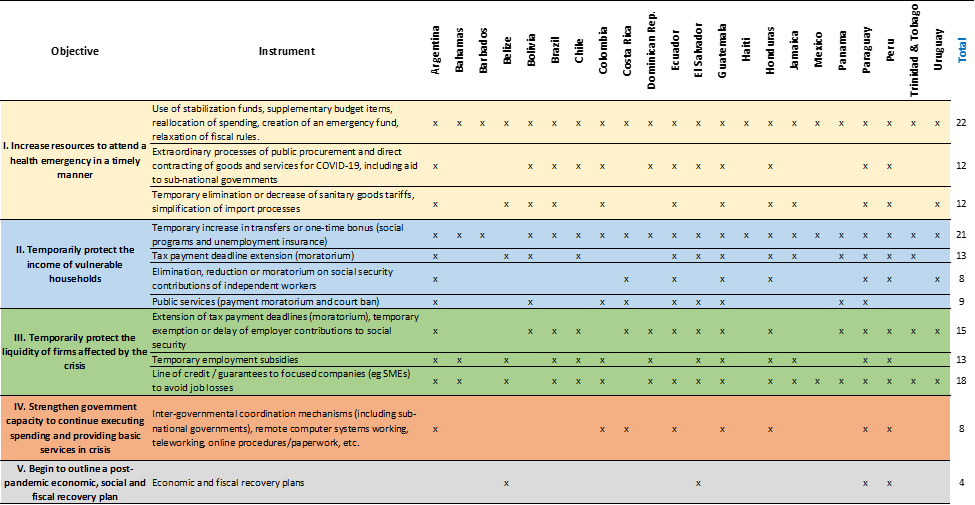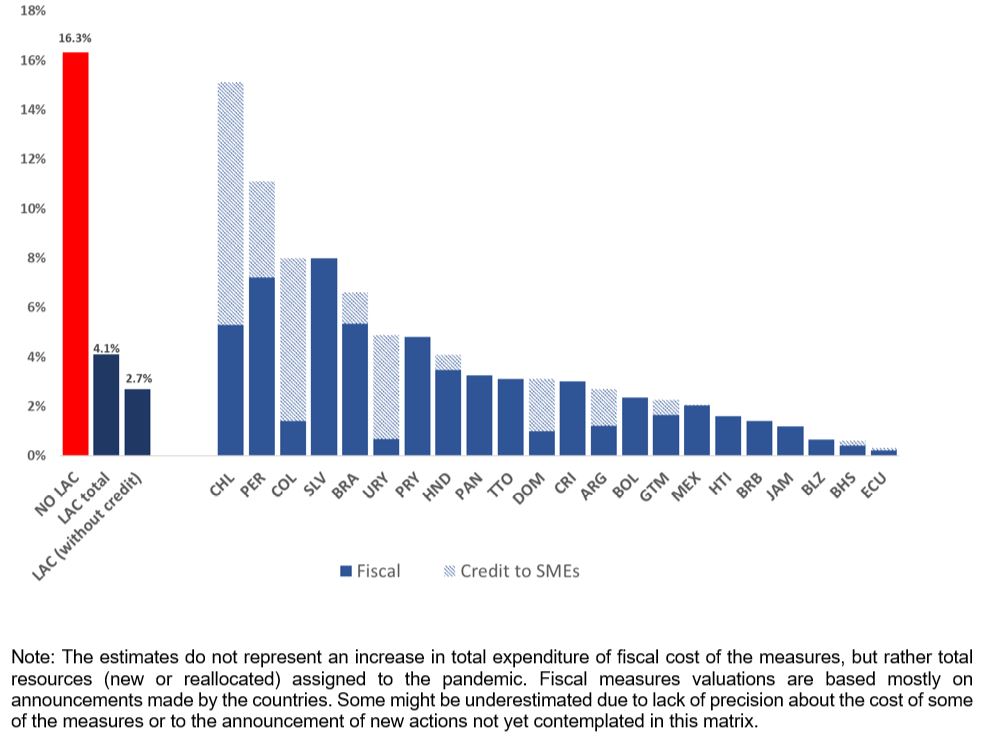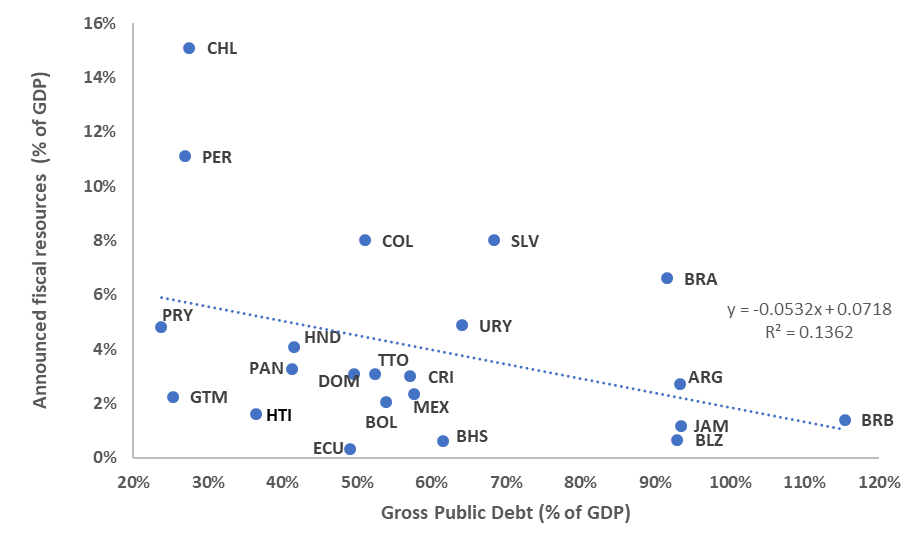As is well known, COVID-19 is highly contagious and has a higher mortality rate among at-risk groups than other similar viruses. In Latin America and the Caribbean (LAC) the first contagion case was registered in late February 2020 and by April 20 the number of people infected was 100,000-plus, with 5,300 dead. Unfortunately, these figures quickly became outdated. The outburst originated in Asia, spread fast through Europe, and hit LAC’s economic activity hard, causing commodity prices and exports demand to plunge, triggering capital flights and pushing up financing costs.
In order to reduce contagion risks and prevent national health systems from collapsing, social distancing and isolation is an essential public health strategy. Accordingly, most countries in LAC have put in place social distancing measures – by mid April, 14 nations had implemented total or nearly total quarantines, 9 adopted severe movement restrictions, and the rest opted for less strict limitations.
Social distancing, while critical, severely reduces human presence in economic, work and recreational activities, deepening the economic downturn caused by external factors and dealing a major blow to fiscal sustainability.
COVID-19 challenges to LAC’s fiscal policies
COVID-19 poses important challenges to LAC’s efforts to obtain the funds it needs to combat the pandemic and minimize its effects on growth and fiscal sustainability. Besides, like the Inter-American Development Bank’s (IDB) President Luis Alberto Moreno recently pointed out, the crisis “exposes all the endemic problems of the region.”
This is why policy and fiscal management measures are at the forefront of global efforts to mitigate and reduce the pandemic’s effects. One of the top priorities is to ensure that more budgetary resources are speedily allocated to the health sector to meet growing demand for services. However, the region’s health systems were already plagued by serious deficiencies, inequity in access to quality service, and ill-preparedness to tackle a pandemic. That’s why extensive work and support from the fiscal sector is required even in order to strengthen government procurement systems during the emergency and to ensure that funds are properly allocated, taking fairness and geographic considerations into account.
To keep people socially isolated to reduce virus contagion risks, countries need to allocate well focused, massive, timely and temporary transfers. This is particularly true in Latin America, where more than 50% of the workforce is informal and therefore many people lack the necessary infrastructure for teleworking, are outside the formal social protection networks, and are unlikely to have the ability to receive a digital check. It is extremely urgent to upgrade those databases of social programs beneficiaries containing incomplete and outdated content and lacking automatic data-crossing capabilities with fiscal administrative data, which is crucial to detect informality and conduct adequate and well focused assistance allocation.
Finally, macrofiscal management tends to be inefficient in several countries that, in addition to having massive and rising public debts, failed to save in times of prosperity and now have limited fiscal room for maneuver to face the crisis. Many countries are literally unable to handle the demand for such high rates of public spending increase and to manage their deficits and debt. Additionally, many of them need to loosen fiscal rules or seek Congressional authorization to take those steps.
In this context of marked institutional frailty, the region needs to deepen its policy and fiscal management coordination and to adopt additional temporary measures for the pandemic and post-pandemic phases as well as for the transition period. Given the severity of the health and economic crisis, adequate design and implementation of such policies is of the essence. Policy and fiscal management should be oriented to cushion at its minimum the impact of the total loss of economic activity and fiscal decline and to ensure a quick return to economic growth and fiscal sustainability.
Fiscal policy in times of social distancing
When designing fiscal policy for the pandemic period, it should be borne in mind that to a great extent, recession is not an unwanted consequence of the pandemic, but rather a deliberate public policy response aimed at reducing workplace attendance in order to save lives. In other words, citizens and their governments make the decision to pay the price of isolating themselves and sacrifice income to save their own lives and that of the rest of the population. From an economic standpoint, this is a fully rational decision, because it maximizes social welfare and justifies a limited period of isolation and the accompanying fiscal policies, as clearly shown in the Pessino & Rasteletti BLOG.
Taking all this into consideration, it is evident that traditional, countercyclical policies aimed at encouraging consumption and investments lose all meaning in the context of a pandemic, since there is not much that can be done during a general quarantine period to reduce the economic recession.
In this stage, fiscal policy should focus on two main objectives.
- It must assign sufficient resources to the health sector so it can cope adequately with the health emergency.
- It should offer “relief” to households, particularly the most vulnerable, including measures to protect the firms that provide employment to their members and thus avoid massive layoffs. When these support policies for households and firms are designed, it should be made clear that the support provided is temporary. This is an important point, since fiscal support policies for households are usually difficult to be reversed.
Support measures for the health sector and for vulnerable families and firms are essential not just because they save lives –thereby reducing the pandemic’s social and economic cost in the short run–, but also because, if taken on time, they lessen economic activity losses and fiscal deterioration on the medium and long term by speeding up a return to economic growth and fiscal sustainability.
LAC countries are already implementing policies in the above mentioned areas. As clearly shown in Table 1, most of them have announced measures to raise the amount of resources available for the health sector. They are also taking a series of steps to support households’ incomes and firms’ liquidity.
TABLE 1. Measures implemented in LAC to tackle the pandemic.

Cost of economic assistance packages for the pandemic
While countries in the region have announced numerous measures to tackle the crisis, their impact has been in most cases modest when compared with that achieved by developed nations, where the average cost of packages announced to fight the health and economic crisis is 16.3% of GDP, with 40%-plus in the case of Italy. While the size of such packages continues to increase in LAC, their announced cost is on average one-fourth of their equivalents in developed nations: 4.1% of GDP, or 2.7% if loans to companies, mostly SMEs, are not included. Like Table 2 shows, there is wide dispersion in the size of packages announced by countries in the region, with total maximum ratios of 15.1% of GDP in Chile, 11.1% in Peru, and 8% in El Salvador. These funds are mostly assigned to protect household incomes and firms liquidity (3.6% of GDP), with a lower portion (0.5%) to tackle the health emergency.
TABLE 2. Public resources announced up to April 15 to tackle the pandemic (as % of GDP)

In addition, it should be noted that the packages’ size tends to be strongly restricted by the fiscal space of the countries involved. As the following graphic shows, there is a negative correlation between the size of policies announced by countries in the region and the level of their gross debt at the start of the pandemic. The PINEDA & VALENCIA BLOG analyses the impact of all economic activity shocks, projecting post-pandemic deficits and debt.
TABLE 3. Correlation between gross debt and resources announced to alleviate the pandemic

Tax policy and public spending policy for the crisis
At the same time that expenditures have risen, tax revenues have dropped due to the sharp economic activity downturn, a fall in commodity prices, and moratoriums and loans provided to companies to help them preserve their headcount, all of which is further reducing the room for fiscal maneuver. Rising taxes does not look like a good option under present circumstances, not even the inflation tax that affects mostly the poor, yet an exception could be to bolster digital VAT, particularly in the post-pandemic stage, as shown in the BARREIX et al BLOG. In countries with little fiscal space and low capacity to take up debt, strong relocation of public spending will be needed, targeting superfluous expenses such as publicity and other inefficiencies, and temporarily reducing public sector salaries. So far, at least seven countries in the region have announced temporary public servants’ wage cuts. It should be noted that this type of measures are being taken in highly developed and fiscally solid nations, like New Zealand.
Fiscal management during the pandemic
It is critical to promote an efficient implementation of fiscal policies designed to tackle the crisis to ensure that financial resources are delivered to the health sector in a timely and focused manner and reach the most vulnerable households and worst-hit companies. This requires a fiscal management infrastructure that not all countries in the region possess. For that reason, financial management systems and institutions tend to become centerpieces in efforts to come up with a speedy and efficient public sector response and avoid bottlenecks such as those seen in previous crises.
Management challenges to implement fiscal policies during emergencies are many and complex. The execution of public resources is typically slowed down by budgetary constraints and cumbersome government procurement processes. Support to families fails to arrive in time for lack of adequate targeting systems and of transparent resource distribution mechanisms, partially caused by low access to banking services in the most vulnerable populations. In addition, the different levels of government are usually not well coordinated, leading to duplication of efforts and shortages of key supplies. Opacity in the handling of resources during the emergency is also a factor, and one that causes public distrust.
To prevent these and other problems, what is needed are flexible, efficient, reliable, transparent and accountable institutions, policies, processes and information systems. Tackling these challenges requires immediate reforms of financial management regulations to improve public resources’ allocation and execution. Major management measures include centralized, coordinated and more transparent government procurement methods, including analysis of key goods and services supply chains. If critical goods are mostly imports, it is also paramount to implement resolutions or policy changes to ease their processing through customs. It may also be necessary to centralize decision making to reduce coordination problems and ensure the availability and efficient distribution of supplies among agencies, hospitals and subnational governments involved. Several countries in the region have already implemented such measures. For example, in the Dominican Republic and Bolivia the Health Ministry coordinates actions, whereas Honduras has set up an ad-hoc emergency committee.
Transition to a post-pandemic environment
As COVID-19’s average rate of spread declines due to quarantine measures and increased immunity, the benefits of isolation start to drop and their economic activity costs begin to rise. This is when a gradual, intelligent suspension of social isolation, following epidemiologists and economists recommendations, becomes necessary. In this transition period, several different actors may resume production, while low-risk areas workers or those who are immunized can return to their normal jobs. This should lead to a gradual resumption of normal economic activity, while at the same time the pandemic continues to lose pace and probability of a fresh outbreak shrink.
In this transition period, policies and fiscal management should continue supporting public health measures, providing the resources for research and tracking of contagion cases and ensuring the availability of diagnostic tests. In addition, family and company support measures should be revised and adapted to a new scenario of gradual return to economic activity, efficiently redirecting transfers towards displaced vulnerable workers and away from those who managed or have the ability to reinsert themselves in the market.
The post-pandemic scenario
Once the transition period is over, given the strong impact of COVID-19 on economic activity, public finances, poverty and inequality, support policies will be required to put the economy, the social fabric and the fiscal situation on their feet again. As Table 1 shows, only a few countries have begun to plan (or announce) what their post-pandemic policies will be – something that should by now be on everyone’s radar.
Returning to a state of growth with equity will require designing and implementing integral plans to stimulate the economy and provide support to the most vulnerable households and firms during this period. These plans should take budgetary restraints into consideration so as not to compromise fiscal sustainability. In many cases, they should include structural reforms to spur the economy from the base up and help improve the mid-term fiscal situation of both central and subnational governments.
In other cases, efforts should focus on promoting intelligent reassignment of public spending, eliminating superfluous expenses, closing transfer and subsidy systems loopholes, fighting corruption in government procurement, and bringing public and private wages to equal levels. These public spending inefficiencies represent an average of 4.4% of the regional GDP.
In this post-pandemic period it is also important to learn from the current pandemic in order to strengthen public finance management systems so countries can be better prepared to face any new future emergencies. It is equally imperative to design contingency plans to minimize crises’ human and non-human costs; to strengthen integrated digital tax and social information systems to detect not just poverty but also informality in order to help reduce tax evasion and target social programs; and to shore up procurement and fiscal transparency systems.
IDB support
To provide speedy support to countries in the region, the IDB has produced a prototype project that promotes good fiscal policies to tackle the consequences of the coronavirus emergency. This prototype, already approved by the Bank’s Board of Directors, is structured as a series of two operations whose policy actions are aimed at helping countries to adopt measures that will help them to face, in the short run, the main challenges posed by the health and economic crisis caused by COVID-19. The first operation is chiefly focused on the availability of resources to face the health emergency and on their efficient execution. It also seeks to support household income and company liquidity, and to pave the road for drawing an economic and fiscal plan to exit the crisis. The second operation’s goal is to promote economic and fiscal recovery through the implementation of medium-term policies to return to a path of growth with equity and fiscal sustainability in the post-pandemic period. Table 1 shows what measures are being proposed and which have already been adopted by LAC countries.
The region is facing an unprecedented crisis and needs to come up with effective public and fiscal policies as soon as possible, quickly securing the funds necessary to combat the pandemic, save lives, and cushion the negative impacts on the economy, public finances, poverty and inequality. We at the IDB are working hard, hand in hand with our member countries, to help them find solutions that are effective, sustainable, and that protect the wellbeing of the people in our region.
We would like to express our gratitude for the excellent research assistance provided by Cristian Chagalj as well as the help of fiscal division specialists who supplied us with data on countries included in this analysis.


Interesting, useful and practical.